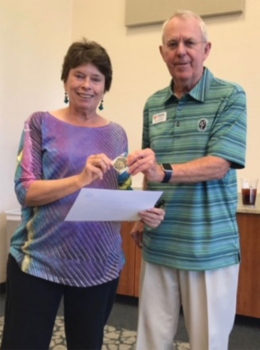 Col Rett Benedict (USAF Ret)
Col Rett Benedict (USAF Ret)
Dr. Sandy McNabb of SaddleBrooke enlightened our members with “Syria: Why is the civil war so difficult to resolve?” Her background is excellent for this topic as she had an international career including university professor, Internet Technologist and Telecommunications executive and lived in England, Belgium, Germany and Egypt. She lived in Egypt for seven years, including during the January 25, 2011 revolution known as the “Arab Spring.”
Dr. McNabb walked us through the four principle conflicts that currently engulf Syria: 1. Assad to be or not to be, 2. Foreign proxies – Iran, Russia, US, Turkey and Saudi Arabia, 3. Radical Islamic participants and 4. Kurdish Independence. She described the challenge early with the observation that there is “no one needle through which to thread solutions to all four conflicts”. Her maps painted a clear picture of these conflicts in different parts of Syria and the surrounding region and brought in both oil economics and the push for access to Mediterranean ports by Russia and Iran.
Syria is over 70 percent Sunni Muslims, but is ruled by the Alawites, a Shia sect, who represent only about 15 percent of the population. Iran is Shia and wants access to ports. Saudi Arabia is Sunni and wants to balance Iran. Turkey wants to prevent Kurdish independence and Russia is driving to regain their influence in the area and use Syrian ports. US goals have morphed from non-interference to countering ISIS over the last ten years and are not currently very clear. The Kurds voted for independence but they have no support. ISIS is mostly defeated or gone underground and an Al-Qaeda affiliate, Jabhat al-Nusra, along with the Peshmerga Kurds are the best fighters, but small in number. And to show the complexity of the area, Russia is courting the Peshmerga and is allying with Turkey which is battling the Kurdish push for independence.
As Dr. McNabb summarized, the current views are that Assad will survive, at least in the short term, Russia and Iran will spend significantly to pursue their interests, radical Islam will be less of a factor and the Kurds are feeling betrayed after their strong role in recovering Iraq and Syrian territory from ISIS. What a maelstrom!
The next Catalina Mountains Chapter of MOAA meeting will be held on Saturday, October 20, 2018, at 11:30 a.m. in the Catalina Room of the Mesquite Grill. The speaker has yet to be selected.
For additional information, contact Col. Rett Benedict, President, 825-7424, rettbenedict@gmail.com or Col. Bill Nagy, MOAA Treasurer, 355-5064, wjnagy@yahoo.com. Check the website www.tucsonmoaa.com for information.
The Catalina Mountains Satellite is part of the Tucson Chapter and encompasses North West Tucson to include Catalina, Oracle, parts of Oro Valley and Marana, SaddleBrooke and Sun City.
The Military Officers Association of America (MOAA) is a nonprofit veterans’ service association dedicated to maintaining a strong national defense and to preserve the earned entitlements of members of the uniformed services and their families and survivors.
